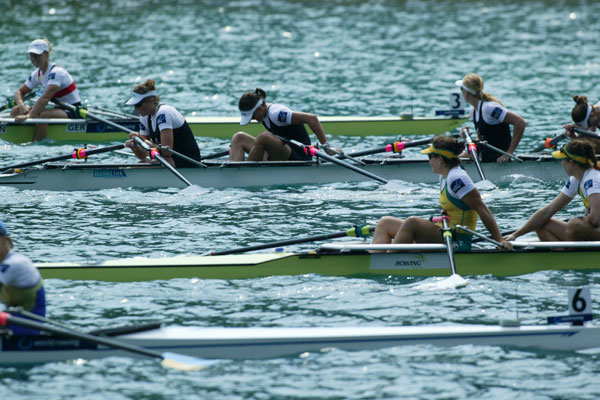Rower rows toward rowing victory (in a rowboat)
Fiona is one quarter of the New Zealand women’s quadruple sculls squad, which has been consistently on the podium in European competition in the past 12 months. They even snagged a bronze at the last World Championships in Bled (that’s in Slovenia). They are a young squad who have proven themselves in international competition and look poised for a surprise (to everyone except themselves) spot on the podium in London.
The quad squad consists of Bourke, Eve Macfarlane (NZ’s youngest Olympic rower at 19), Louise Trappitt and Sarah Gray. The girls have been together for a couple of years now and are currently training full time at the New Zealand rowing base at Lake Karapiro. Under the watchful eye of super-coach Dick Tonks, the girls are slogging it out 6 days a week to be in top form when July rolls around. Fiona Bourke’s day consists of four hours on the water, cycling, weights, mat work and physio treatment as well as regular trips to the nutritionist and sports psychologist to get the mind and motor right. She’s pretty busy at the moment but luckily for Critic she let us steal her lunch break to have a quick chat.
Fiona was a fresher at Otago way back in 2007 (she has a BCom and a BSc underway) but has recently put the scarfie dream on hold to chase Olympic metal. Intriguingly her first year at uni also turned out to be her first year in a rowboat. “I came down for my first year and went along to the Clubs and Socs open day (they have one every O-Week if you missed it). I saw rowing there and it sparked an interest. That year I participated in New Zealand Uni Games as a novice (kind of like a rowing fresher) and caught the rowing bug.”
A year later things really kicked up a notch for Bourke. “I decided that I quite enjoyed it. I set a goal for myself that I wanted to make the New Zealand U23 crew before I was too old.” Juggling study and serious rowing takes a real commitment. “By the time you have two trainings a day and studying as well, you have to make sure every part of your day is being used productively. Now that I look back on it I think, crikey you were really pushed for time. When you’ve got to do it, you just knuckle down and do it.”
London is just the beginning for Fiona and the crew. “I would say that we are a developing crew. We have a good few years left in us. The stroke and I have only been rowing for 4 or 5 years. We are a very young crew. That works to our advantage because we are still keen and really ready to give it everything.”
Team bonding is a huge part of their success. “We know that as soon as we stop having fun we stop rowing well. We know each other pretty much inside out. When you go overseas you live in each other’s pockets for three and a half months then you come back here and see each other for most of the day. We definitely become a tight little unit.”
Fiona sensibly refused to be drawn into any speculation about how much shagging the New Zealand Rowers would be getting down to at the notorious sexual hotbed that is an Olympic Games Village. For the record, at the Vancouver Winter Games 100,000 condoms had to be shipped into the athletes’ village. That’s about 14 per athlete, and they still ran out. Apparently the hormones run hot in such finely-tuned athletes. Bourke fobbed Critic off by saying “We are looking forward to the racing side of things more. That’s not the reason we’re going over there”. Smooth.
On coach Richard “Dick” Tonks: “He’s a man of few words but you know that when he says something you’ve just got to listen to it. You have to really take what he says and really use it and apply it to your rowing. He’s got a no-bullshit approach. You know exactly where you stand. You turn up on time, you train hard, you do as he says and you trust that he’ll point you in the right direction.”
Although you can never become rich from rowing, Bourke and her teammates are in it for the long haul. Their real target is a gold medal in Rio de Janeiro in 2016. Luckily for Fiona, rowers generally peak around age 26-27. Fiona Bourke is 23 this year. You do the math.








